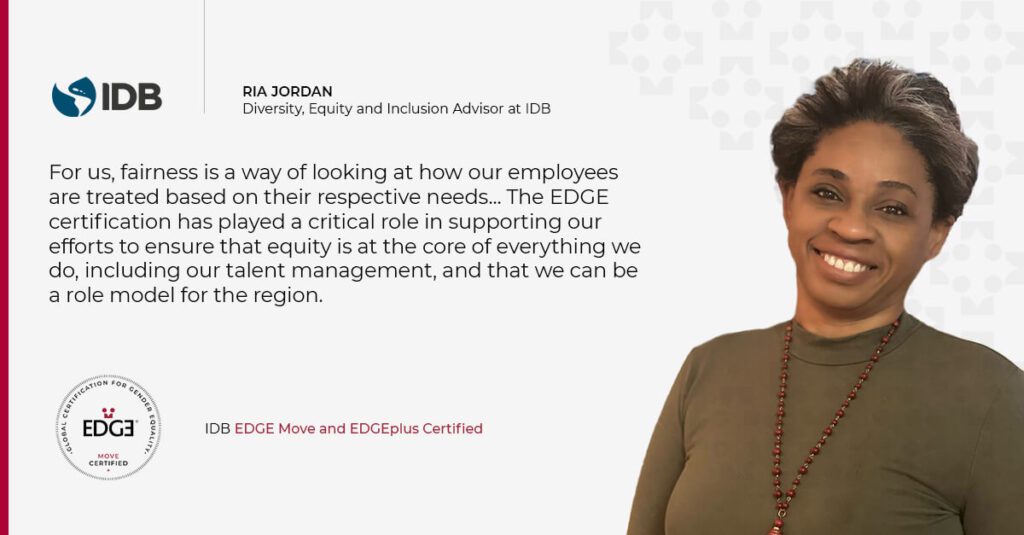How did the business case for gender balance DE&I evolved over the last 18 months?
Ria : The EDGE certification and our efforts towards gender balance in the organization have a significant impact on our institutional performance. The IDB Group finances its operations by issuing bonds in the international capital markets and the financial rating agencies are those that assign us our credit ratings, which have been triple A since 1962. Increasingly, these rating agencies are looking at social elements such as diversity as a component for our qualifications. Positive scores in this regard correlate with a reduced cost of capital that could translate into higher investor interest in IDB Group bonds and consequently could help lower borrowing costs for our clients. This is important because, in the last 18 months, Latin America and the Caribbean have been facing one of the worst crises in their history, the full magnitude of which is hard to quantify. Over the next several years, the countries we serve will have to allocate the limited financial resources they have to policies for overcoming the health crisis, containing its social and economic costs. Therefore, the low borrowing costs will ensure that our countries can focus on economic recovery and the transversal issue of gender inclusion.
The IDB Group has also developed an agenda called Vision 2025 where our institutional priorities focus on the recovery of Latin America and the Caribbean, considering diversity and gender as cross-cutting issues. Through this agenda, the organization is broadening its approach to gender balance with a focus on intersectionality. The pandemic has highlighted that all experiences and responses are not equal, and some groups may be experiencing forms of bias or discrimination. Intersectional gender equality offers a new lens through which we, as an institution, can address individual concerns and challenges based on themes such as race/ethnicity and sexual orientation within our organization and our projects in the region.
As employers, we want to be a workplace that celebrates and values the individualities and experiences of our employees. We believe that having a diverse workforce, past the monochromatic lens of gender only, positively connects with a unique skillset for problem-solving and the means to address the most urgent development challenges in Latin America and the Caribbean. This is why, in December 2020, we changed our strategy framework from “diversity and inclusion” to “diversity, equity and inclusion”. For us, fairness is a way of looking at how our employees are treated based on their respective needs. This may include equal treatment or different treatment, but is considered equivalent in terms of rights, benefits, obligations, and opportunities. The EDGE certification has played a critical role in supporting our efforts to ensure that equity is at the core of everything we do, including our talent management, and that we can be a role model for the region.
EDGE Certification brings visibility and credibility to the change happening inside the organization. At the same time, it creates the premises for diverse talent to thrive at work. Tell us some stories about how your employees benefit from the EDGE Certification journey of your organization.
Ria : One of the most tangible benefits of the EDGE Certification has been the process of developing an action plan to close the gaps which are identified during the recertification process. For example, one of the areas identified for development during the first EDGE certification process was the inequity in our parental leave policies. At that time, the IDB Group had separate policies for men and women (maternity and paternity leave). We recognized, then, that our policy was not gender-inclusive and that we needed to focus on both men and women equally. Moreover, we saw an opportunity to create greater work-life integration for all employees with caregiving responsibilities regardless of gender. The decision to revise our parental leave policy was and continues to be a visible transformative action inside the IDB Group in support of all genders.
Another initiative we started after the first EDGE certification was the Diversity, Equity, and Inclusion Awards Program to recognize employees whose commitment to equity and inclusion is unwavering. Recognizing the work of our employees was key to ensuring there are diverse opinions, ways of working, and a sense of belonging in the workplace. This program was an opportunity to celebrate the good work of our employees. The revelation of positive behaviors and support of equity provided strong examples for others to follow. The creation of this recognition program was one of the recommendations emanating from the first EDGE certification and was directly responsible for us promoting visibility and credibility to our diversity, equity, and inclusion agenda.
Our EDGE certification has also helped us strengthen our platforms and resources for women employees to succeed. We are proud of our Emerging Women Leaders (EWL) program, which currently has more than 280 graduates – women leaders – across the region, and our Employee Resource Group called Women NET, dedicated to raising awareness and support activities that foster the empowerment of women and gender equality. The women who have taken advantage of these platforms understand that it is time to change the diversity among our leadership teams and have demonstrated a dedication towards fostering new forms of leadership and empowerment within the organization.
Obtaining this certification for the third time in a row is significant, as it publicly demonstrates that we are intentional in our actions to close gender gaps and promote an equitable workplace. As the first development bank in the Americas and the second worldwide to obtain the second level of this distinction: EDGE Move, we want to serve as an example for the region and demonstrate how equity is at the center of all our priority areas, both internally and in projects in the region.
What do you think workplace gender balance, diversity and inclusion means to the next generation (e.g., of leaders / customers / investors)?
Ria : Gender balance is a persistent discussion in many spectrums of society, development, politics, culture, and more. Efforts by individual activists, private enterprises, and organizations like the IDB Group are instrumental in changing attitudes towards, equal pay for equivalent work, sexual abuse and harassment, and equal opportunities for men and women in healthcare, economic activity, and education.
Moreover, the discourse is also shifting past a unilateral focus on gender to diversity and inclusion more generally. When we think about women and girls now, we are also thinking about the unique experience of women with intersecting identities.
Realistically we know that the impact of the pandemic will affect present and future generations, so we must actively engage in policy dialogue and partnerships to ensure that gender equality and empowerment remains a key issue in national policies and in the programming of our borrowing member countries. Our clients are looking to us as a trusted advisor and development partner for technical and financial support in pursuit of gender equality because we can all agree that when women can thrive alongside their male counterparts, economies grow, and countries thrive.
Internally, our employees are also following everything we do; not just to promote a gender-equitable working environment but to create inclusive conditions for diverse talent. Today’s employee is searching for a workplace where there are equal opportunities for men and women to earn a living and succeed, while also having the flexibility to be caregivers and pursue their personal goals. We have actively been complying with the demands of new employee aspirations. For example, we are providing a financial support facility for those who are turning to alternative family planning options. Moreover, and for several years now, we have implemented an alternative working schedule policy to help employees achieve better work-life integration. The pandemic, which has meant that everyone is working remotely, caused us to double our efforts to foster a climate of trust, flexibility, and autonomy with even more options which means all employees have the flexibility to manage their time with more adaptability.
At the IDB Group, our mission is to improve lives. We promote this by visibly demonstrating the value of inclusion and working towards securing a world of equal opportunities and outcomes for all, including our next generations.






